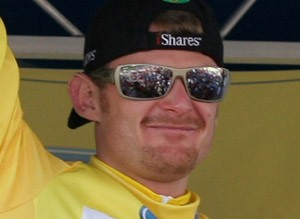Novitsky gathering evidence for the Grand Jury
 Floyd Landis’s email to cycling officials claiming there was widespread doping in the US Postal Service team has prompted Food and Drug Administration agent Jeff Novitsky to look into seven-time Tour de France champion Lance Armstrong. The investigation, which was originally focused on fashion designer Michael Ball’s Rock Racing team, is now exploring whether it’s possible that the American team used taxpayer money to purchase doping products.
Floyd Landis’s email to cycling officials claiming there was widespread doping in the US Postal Service team has prompted Food and Drug Administration agent Jeff Novitsky to look into seven-time Tour de France champion Lance Armstrong. The investigation, which was originally focused on fashion designer Michael Ball’s Rock Racing team, is now exploring whether it’s possible that the American team used taxpayer money to purchase doping products.
VeloNation spoke with accounting fraud expert from Brigham Young University, Dr. Mark Zimbelman, to gain some insight into what the prosecution may be working on behind the scenes, and possible next steps with the investigation.
“If Novitzky wants to try to show that the USPS team funds were used for doping, he will need access to the USPS team’s accounting records including bank statements, check registers, disbursement records, etc,” Zimbelman said.
“If we take the assumption that there has been wrongdoing, but only for the sake of the discussion since nothing has yet been proven – if he [Novitsky] could get documentation of a payment made to an individual associated with doping, such as a figure like doctor Eufemiano Fuentes, who was proven guilty in the Operación Puerto case, or a company such as Amgen for EPO, then he could prove that USPS cycling funds were used for doping. In a court case, a document such as that would be fairly hard evidence of fraud on the part of the team that Armstrong belonged to, even if he was never shown to have failed a doping test.”
The fact that Landis is an admitted liar brings up credibility issues with repsect to the case. The Washington Post reported in June that anonymous sources with knowledge of the investigation confirmed at least two individuals have corroborated some of Landis’s claims of systematic doping, and Zimbelman said that sort of testimony can make a big difference.
“Next, the case would need to link Lance to the team doping,” he explained. “I would expect that the testimony of former teammates such as Landis and others would be used to show that Lance was part of the doping process. If they got enough former teammates to testify against Lance, that would carry significant weight in a court of law. It would establish that the USPS team did pay for doping products or assistance.”
Armstrong’s attorneys complained that “sweetheart deals” were being offered that could result in prior testimony being changed, but in August Virginia attorney William M. Cusmano told VeloNation that the tactic is a common practice. “Getting incentives doesn’t make them liars. It doesn’t make an honest person out of a liar, of course, but it doesn’t make a liar out of an honest person, either.”
“Many people need a reason to stick their necks out,” Cusmano said. “If they didn’t get a deal, why would they expose themselves to prosecution by saying anything? That doesn’t make any sense. Sometimes the incentive is only half the pressure — they [prosecutors] will tell you that if you don’t cooperate, you’re left out in the wind, too, and a target.
“The other thing about ‘incentives’,” he continued, “they don’t offer them unless you proffer that you have something that they want, and they have to be convinced that you really have it. And then the deals are contingent on your giving up what you said you’d give up.
“It’s common to provide incentives; it’s common to question the incentivized. Who the heck knows? Dirty business all around,” he concluded.
But the bigger challenge that lies ahead for prosecutors is being able to show the Grand Jury that there is actually a case against the cycling icon. Novitsky has been gathering evidence for several months now and, with a statute of limitations on the charges fast approaching, he will need to work fast if he uncovers substantial evidence.
“Getting the accounting documents is a matter of time and money,” Zimbelman added. “As shown in the past with many cases where there have been fraudulent transactions, the checks are probably out there.
“From my experience, an operation as big as the USPS cycling team probably had to document what they were using their money for, so for the prosecutors the trick will be getting access.
“Novitzky will need to convince the Grand Jury that there is a strong enough case for him to be able to get this evidence. If he manages to do that, he will have a team of forensic accountants scour the data looking for the needle in the haystack. If he can get electronic evidence then it may be easier to search through using computer technology.”
Zimbelman sees parallels with another high-profile case headed up by the FDA agent.
“Based on the BALCO case, Novitzky will probably want to get Armstrong on record denying he used any doping products first, and then, if he can find any, bring out his evidence to show Lance perjured himself.
“If, for example, Armstrong denies he ever doped and Novitzky can produce evidence showing the USPS team bought illegal drugs, and he also has several teammates testify that Lance was involved, then Novitzky could send him to jail.”
Marion Jones ended up spending time in jail, but Zimberman doubts the same will be true of Armstrong.
“I personally think it is a longshot that Lance will ever be put in jail, but this [process of gathering evidence] may be Novitzky’s strategy.”